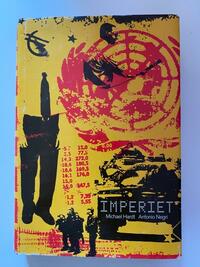Take a photo of a barcode or cover
I'm not sure why I've not read this book before, as it's pretty well known. Partly I suspect because it's very strongly influenced by French writers like Deleuze, Guattari, and Foucault - all of whom I'm pretty unfamiliar with.
Hardt and Negri theorise the modern working class as a 'multitude', international, working in common through information networks, in ways which are fundamentally social. There's a strong link here to what Marx wrote in the Grundrisse about the development of a "general intellect" - the point at which scientific and technical development has progressed so far that labour no longer has any specific content, and the labour theory of value starts to break down. Hardt and Negri develop this theory for the capitalism of today. While this is interesting, it also feels a little disconnected from the actual working class of the modern world. So it makes sense in theory but there's still work to do to make it a theory that could be used practically for a modern progressive movement.
Hardt and Negri also develop the idea of a new global order of control that is replacing that of sovereign nation states with controlled borders that manage their own economy. The modern system of control ("Empire") is global, driven by big corporations, and eschews national borders. It's all about the flow of information. In some ways this is a development of Rosa Luxemburg's thinking about capitalism's need for an 'outside' - something beyond that the global market can expand into, to absorb it's surplus and provide a source of new raw material to drive expansion. In a sense, Hardt and Negri develop this theory to show what happens when the market has expanded to cover the whole world and there is no more 'outside'. How does capitalism overcome the crisis this limit prompts? The answer is the 'Empire', the global order theorised by Hardt and Negri which takes advantage of the innovations created by the new social, networked labour to allow accumulation to continue.
All of this adds up to a theory which develops thinking about the move from a modern (industrial, colonial, imperialist) capitalism to postmodern (informational, networked, global) one.
As I noted, the language is that of French philosophy and that makes it a little difficult to follow, and perhaps a little disconnected from reality. It is also now perhaps a little dated, having been published in 2001 and therefore before both Donald Trump and Brexit - which in the context of Hardt and Negri's theory might be thought of as a Thermidorian reaction against the revolutionary change represented by Empire. That said, this is an important book in theorising the change in the movement from modernism to postmodernism and what that means for the prospect progressive change.
This review is also available on my blog here: https://marxadventure.wordpress.com/2024/02/17/review-empire/
And I wrote a blog post picking up some of the themes in Empire and using them to think about Brexit here:
https://marxadventure.wordpress.com/2024/04/18/brexit-and-empire/
Hardt and Negri theorise the modern working class as a 'multitude', international, working in common through information networks, in ways which are fundamentally social. There's a strong link here to what Marx wrote in the Grundrisse about the development of a "general intellect" - the point at which scientific and technical development has progressed so far that labour no longer has any specific content, and the labour theory of value starts to break down. Hardt and Negri develop this theory for the capitalism of today. While this is interesting, it also feels a little disconnected from the actual working class of the modern world. So it makes sense in theory but there's still work to do to make it a theory that could be used practically for a modern progressive movement.
Hardt and Negri also develop the idea of a new global order of control that is replacing that of sovereign nation states with controlled borders that manage their own economy. The modern system of control ("Empire") is global, driven by big corporations, and eschews national borders. It's all about the flow of information. In some ways this is a development of Rosa Luxemburg's thinking about capitalism's need for an 'outside' - something beyond that the global market can expand into, to absorb it's surplus and provide a source of new raw material to drive expansion. In a sense, Hardt and Negri develop this theory to show what happens when the market has expanded to cover the whole world and there is no more 'outside'. How does capitalism overcome the crisis this limit prompts? The answer is the 'Empire', the global order theorised by Hardt and Negri which takes advantage of the innovations created by the new social, networked labour to allow accumulation to continue.
All of this adds up to a theory which develops thinking about the move from a modern (industrial, colonial, imperialist) capitalism to postmodern (informational, networked, global) one.
As I noted, the language is that of French philosophy and that makes it a little difficult to follow, and perhaps a little disconnected from reality. It is also now perhaps a little dated, having been published in 2001 and therefore before both Donald Trump and Brexit - which in the context of Hardt and Negri's theory might be thought of as a Thermidorian reaction against the revolutionary change represented by Empire. That said, this is an important book in theorising the change in the movement from modernism to postmodernism and what that means for the prospect progressive change.
This review is also available on my blog here: https://marxadventure.wordpress.com/2024/02/17/review-empire/
And I wrote a blog post picking up some of the themes in Empire and using them to think about Brexit here:
https://marxadventure.wordpress.com/2024/04/18/brexit-and-empire/
challenging
informative
slow-paced
challenging
slow-paced
Is This An Overview?
Empire is a form of sovereign power that governs globalization. The global economic and cultural exchanges. The sovereignty of nation-states has declined due to an inability to govern economic and cultural exchanges. The sovereignty of nation-states is being replaced by a sovereignty composed of national and supranational institutions. Empire does not mean imperialism, and does not establish a territorial center of power. Empire’s governance is decentralized.
Empires seek to be inclusive to different values, to different people. Creating methods for negotiating a perpetual and universal peace. The empire’s justification for the use of force, is to use force in the service of resolving humanitarian problems, and imposing peace. Empire is brought into being by the capacity to resolve conflicts. Through empire, people have been overcoming repressive political and economic methods. Through empire, people have been experimenting with alternative methods of liberty, while seeking international cohesion. The power of empires comes from making people more productive.
Caveats?
This book can be difficult to read. Difficult because of the way the authors explain the ideas, using a myriad of philosophical and historic references. The references are provided a short description, but read like jargon meant for those who already know the references. References that could be interpreted differently based on what details have been added or left out.
[b:Postscript on the Societies of Control|19499462|Postscript on the Societies of Control|Gilles Deleuze|https://i.gr-assets.com/images/S/compressed.photo.goodreads.com/books/1387200756l/19499462._SX50_.jpg|27613127] but 100 times longer
Clever and clearer than Foucault. This jab at contemporary biopolitics is smart but a little world-wearying. I'm still not sure how I'm supposed to stage a Counter-Empire...
Aslında birşeyleri yorumlarken, bilindik,tanıdık veya klişe kavramları kullandığımızda pek etki etmediğini görebiliyoruz.Yani her taşın altından emperyalist bir Amerika'yı çıkarmak, yorumdan sayılmaz oldu.Çünkü bu nasıl bir emperyalist güçtür ki, evimize hatta yatak odamıza kadar işlesin bizi engellesin, birazda yaşamdaki mutluluklarımız veya kaygılarmızda buna dahil etmeliyiz.
Böylelikle mutlaka bunu bir sistematik işleyişi vardır.Hatta neden-sonuç ekseninde büyükler ve küçükler zorunlu bir şekilde bu sistematiğin işleyişini sağlamak zorundalar.İşte bu kitap Hardt ve Negri'nin üzerinde çok çalıştıkları ve ismine de imparatorluk dedikleri sistemi tüm dayanak ve yaptırımlarıyla gözler önününe sermekteler.Global kavramını içi dolu ve derinliğine kadar öğrenmek istiyorsanız bu kitabı tavsiye ederim.Ayrıca bu kitabı okuduğunuzda devamı niteliğinde olan [b:Çokluk: İmparatorluk Çağında Savaş ve Demokrasi|7357146|Çokluk İmparatorluk Çağında Savaş ve Demokrasi|Michael Hardt|http://d.gr-assets.com/books/1261192744s/7357146.jpg|418722] ile de taçlandırabilirsiniz.
Keyifli Okumalar...
Böylelikle mutlaka bunu bir sistematik işleyişi vardır.Hatta neden-sonuç ekseninde büyükler ve küçükler zorunlu bir şekilde bu sistematiğin işleyişini sağlamak zorundalar.İşte bu kitap Hardt ve Negri'nin üzerinde çok çalıştıkları ve ismine de imparatorluk dedikleri sistemi tüm dayanak ve yaptırımlarıyla gözler önününe sermekteler.Global kavramını içi dolu ve derinliğine kadar öğrenmek istiyorsanız bu kitabı tavsiye ederim.Ayrıca bu kitabı okuduğunuzda devamı niteliğinde olan [b:Çokluk: İmparatorluk Çağında Savaş ve Demokrasi|7357146|Çokluk İmparatorluk Çağında Savaş ve Demokrasi|Michael Hardt|http://d.gr-assets.com/books/1261192744s/7357146.jpg|418722] ile de taçlandırabilirsiniz.
Keyifli Okumalar...
A very difficult read....I think it was about the Communist explication of Empire and its effect on the multitude. I think they like to hear themselves talk or see themselves write. Incredibly verbose, it was difficult to keep it all straight in my head. That said, if you are so inclined to the Left, or Communism in particular, then this book is for you.
challenging
informative
reflective
slow-paced
Theoretically dense and often repetitive but the core ideas are valuable
This book is a patchwork of theories that have been synthesized at a blistering pace. What makes this masterful is that it does so in a way that enlightens us to a new paradigm of governance, power, and economy. The downside of this is that there are so many open questions and ways in which this book does not deal well with someone on the look out for paradoxes in theories that are suddenly mashed together. This book is not a functioning body; it's an undead, unawakened Frankenstein.
I can use this book for talking points, or hypothetical starting points for research, but I'm more likely to pull from _The Stack_ and affiliated work for my field. There has since been a lot of work which is more consistent about facets of this book.
I can use this book for talking points, or hypothetical starting points for research, but I'm more likely to pull from _The Stack_ and affiliated work for my field. There has since been a lot of work which is more consistent about facets of this book.
Absolutely brutal read. Works through centuries of Western philosophy and tries to portray the modern, globalized world as "Empire," a seemingly totalitarian structure of global capitalism. I disagree with their conclusions and find that there has not been as significant of a paradigm shift as Hardt and Negri argue. At times, the neo-Marxist jargon is so difficult and vague that the work overall feels weak.
Moreover, there are no people in the book, with the exception of the "multitude" (whatever that means). There are no places, only structures. As such, the book is not rooted in material realities, but abstraction. It is unverifiable and there is little in the way of primary sources to go back and check the authors' work, with the exception of philosophical texts.
Although this book generated considerable discussion in the early noughties, this is one text that does not seem capable of ensuring lasting value. It tries to interact with history, politics, anthropology, economics, and more, but subverts the methodologies of all of those fields. I guess we can throw this one into the "dustbin of history."
Moreover, there are no people in the book, with the exception of the "multitude" (whatever that means). There are no places, only structures. As such, the book is not rooted in material realities, but abstraction. It is unverifiable and there is little in the way of primary sources to go back and check the authors' work, with the exception of philosophical texts.
Although this book generated considerable discussion in the early noughties, this is one text that does not seem capable of ensuring lasting value. It tries to interact with history, politics, anthropology, economics, and more, but subverts the methodologies of all of those fields. I guess we can throw this one into the "dustbin of history."



